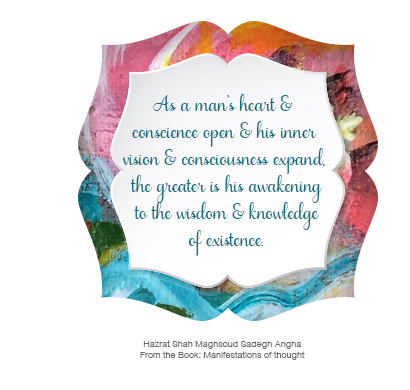Why Practice Sufism?
"The wise are those who acquire benefits and repel losses."
Professor Sadegh Angha
In the book Dawn, Professor Sadegh Angha raises the following fundamental question and guides us to reach the answer. The question is:
"If people are honest, adhere to all the social laws and agreements, do not base their beliefs on blind obedience, and yet do not have a religion, will they lose?"
'Note that this question refers to a person who is honest, obedient, trustworthy, effective in society, and harmless and helpful to others. If this kind of a person was not cognizant of the truth, or totally disbelieved in religion, would that person lose? and he further describes that: "The teachings of Sufism do not address people who are ignorant or irresponsible. Sufism’s teachings encompass and transcend science and other theoretical and speculative learning." Therefore, Sufism addresses the educated, keen-minded, and informed individuals. One of them, with all the stated qualifications, might ask: 'Why should I learn your instructions? Do I lack something?' What would be your answer?"
Professor Sadegh Angha further elucidates: "It is said that the wise are those who acquire benefits and repel losses, while the ignorant, on the contrary, are unable to distinguish between their losses and benefits. In order to communicate, to make decisions, to distinguish between right or wrong, between gain and loss for ourselves or society, we need a constant and unchangeable measure." We need a gauge that remains unaffected by place, time, or social conditions. For example, without standardized units to measure time, weight, or distance, personal, social, or economic interactions would be extremely difficult.
What, then, is this unchangeable gauge that helps us discover the true value and potentials of the individual? What gauge would enable us to distinguish between right and wrong, to gain benefits an avoid loss?
Professor Sadegh Angha conveys that, "To continue the discussion, I must define truth. Philosophers say, 'The settling down of a thing in its proper place is truth.’ I say, whatever exists and is constant an unchangeable is truth. Therefore, whatever does not exist is not truth, and whatever exists but is changeable and not constant, is not truth. The human body exists, but it changes. Seasons change the appearance of nature. Love and affection erect their foundations in our hearts but sometimes change into enmity and abhorrence. Stars seem to sparkle in the sky forever, but they will also be extinguished and are not constant. In brief, whatever we see and many things that we do not see exist, but are not constant until the words of God are realized, until everything is annihilated except that everlasting, divine, and tender being that everyone calls "I", the "true self."
"I" is the constant and stable identity. "I" is not dependent or subject to change through time or with place. It is the constant and unchangeable unit that all people have within themselves. "I" is the part of the truth that cannot be known unless through the truth itself. True knowledge is attained this way, and results in tranquility and contentment.
"I" is the constant measure we need "to acquire benefits and repel losses." Sufism provides the knowledge and facilitates discovery of the "I". This is the meaning of these words of God: "My saints are under my domes. No one knows them but I."
|
1. Molana Shah Maghsoud Sadegh Angha, Dawn (Verdugo City, CA: M.T.O. Shahmaghsoudi Publications, 1991), 23-24. |
